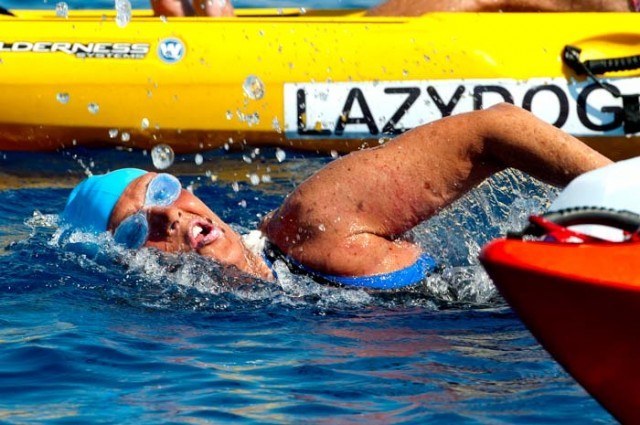
Note: Opinions in this article do not necessarily reflect the views of SwimSwam as a whole.
It’s easy to nitpick the details of biopics and point out various things the movie missed about its subject. But as recently released biopics such as Christopher Nolan‘s “Oppenheimer” and Bradley Cooper‘s “Maestro” show, it’s possible to make a good movie just by going in-depth on a snippet of the subject’s life while leaving out other unrelated life events and maybe getting insignificant matters wrong.
Biopics become problematic, though, when they misrepresent details about their subject that are crucial to the storyline. And that’s exactly what’s wrong with “Nyad”, Jimmy Chin and Elizabeth Chai Vasarhelyi‘s 2023 feature film about open water swimmer Diana Nyad and her attempts to swim from Cuba to Florida at age 64. Julia Cox, who wrote her first film, wrote the screenplay based on Nyad’s 2015 book “Find a Way”. The biopic was released in theaters on October 23, 2023, and became available to stream on Netflix on Nov. 3.
There was plenty of skeptical reaction to Nyad’s 110-mile Cuba-to-Florida swim in 2013. People questioned whether the swim was unaided like Nyad initially claimed it to be (she recently told The New York Times that she’d now accept ratification as an assisted swim), and if independent news media monitored it from start to finish. It also didn’t help that Nyad was already a controversial figure in the swimming community after fabricating several of her previous accomplishments. In fact, Guinness World Records no longer recognizes her as the first person to swim from Cuba to Florida without a shark cage. The biopic doesn’t acknowledge any of these disputes or discrepancies, and it suggests multiple times that Nyad was the first swimmer to complete the Cuba-to-Florida swim in general—ignoring that Walter Poenisch and Susie Maroney had both done so in the past (with caveats).
When a biopic omits and falsifies the number of facts that “Nyad” did, it crosses the line from exercising artistic freedom to simply spreading misinformation. To put this into perspective, the story that the movie told would be the equivalent of “Maestro”, which is centered around the marriage of classical music conductor Leonard Bernstein and Felicia Montealegre, not depicting any of Bernstein’s extramarital affairs. The inaccurate portrayals in “Nyad” felt like a letdown to the marathon swimming community that the movie intends to represent, especially when it’s a niche group that doesn’t typically get a lot of media attention in the first place.
See Also:
- Open Water Swimmers Have Mixed Feelings About New ‘Nyad’ Biopic Coming To Netflix
- Diana Nyad, ‘Nyad’ Directors Defend Biopic Ahead Of Nov. 3 Netflix Release
- WOWSA, MSF Disagree On Nyad Swim Ratification Ahead Of Upcoming Biopic
Chin and Vasarhelyi, who won an Academy Award for their 2018 documentary “Free Solo”, said they were aware of the controversies around Nyad’s accomplishment but chose not to center their film around the swim’s logistics.
“Our film is not about a record,” Vasarhelyi told the LA Times. “Our film is not about how many times someone was touched. It’s about how a woman woke up at 60 and realized she wasn’t finished, even though the world may be finished with her.”
And while I can understand the “it’s about the journey and not the destination” mindset, it still doesn’t make it right to exclude important information related to the storyline. But the bigger issue with the filmmakers’ sentiment was that the story they were trying to tell was underwhelming too.
“Nyad” starts with a sequence of various footage from Nyad’s past, specifically when she attempted and failed to swim from Cuba to Florida for the first time at age 28. The film then cuts to 2010, opening with several scenes between longtime best friends Nyad (Annette Bening) and Bonnie Stoll (Jodie Foster). Through their conversations, it’s almost a little too clear that Nyad is bored and feels something is missing in her life. Just a few short scenes later, she’s back in the pool training for a career resurgence and has somehow convinced Stoll, who has no experience in swimming whatsoever, to become her coach.
The start of this movie doesn’t do a great job at “show, don’t tell,” with the dialogue between Nyad and Stoll falling flat and restating the obvious. The film also moves too quickly, as we watch Nyad get in shape (seemingly) instantly without seeing too much detail about the mental and physical strain that a 64-year-old woman might experience to make this sort of comeback. And when we do see that detail — like when Stoll tells Nyad that World Open Water Swimming Association ambassador Steve Munatones didn’t think she was capable of the Cuba-to-Florida swim — it’s portrayed in a shallow manner that shows Nyad’s surface-level anger and determination but not how the skepticism truly affected her psychologically.
The second half of the movie focuses on Nyad’s final three attempts to swim from Cuba to Florida, and we get interactions between Nyad, Stoll, navigator John Bartlett (Rhys Ifans), and other crew members who closely follow Nyad when she swims. While I felt more invested than I did in the former half, the scenes of her attempt after attempt to complete this swimmer got very repetitive. And issues from the first half lingered — there was a moment after Nyad’s second failure where she was finally being held accountable, but then things reverted to old ways once again, further proving the film’s lack of depth and desire to skip out on character development or emotional connection. Yes, there was a fair share of dramatic scenes in Nyad, but they mostly felt forced and didn’t bring me closer to the characters.
Plot aside, I was a little mystified by some of the formal elements of Nyad. The lighting and colors used in the film (specifically the hot pink and neon yellow texts that kept on appearing), gave it a bright, pastel-like feel, and the set design made me feel like I was witnessing a tropical vacation getaway rather than a grueling athletic task. I couldn’t help but think that this feel-good cinematography ironically paralleled how the movie masks the darker intricacies of Nyad’s career.
The constant presence of audio clips from a younger Nyad confused me. While they provided good insight into what she was like in the past, they isolated me from the version of Nyad played by Bening, which goes against a biopic’s purpose (or at least what the purpose should be) to make the viewer believe that an actor is truly the same person as the film’s subject. There were also constant flashbacks to her childhood that felt cliche and portrayed heavy subjects like the sexual abuse she experienced in a rushed manner. Though, to Cox’s credit, the scene where present-day Nyad confides in Stoll about her past trauma was the most well-written scene in the film —a rare moment where Nyad’s words felt genuine and not in-your-face.
Don’t get me wrong — if made right, I love the idea of a film about a complex, imperfect woman, especially when the majority of popular biopics released this year were about men (or a woman best known for being the wife of a famous man, as in the case of Priscilla). And this review isn’t an insult to the film’s creators. I know that Chin and Vasarhelyi are capable of incredible filmmaking about extraordinary athletic achievements as shown in “Free Solo.” And even though Cox’s screenplay was flawed in depicting the general plot of Nyad, many of her anecdotal lines and smaller scenes felt funny or powerful, which highlights the potential she has with future writing.
But when all is said and done, I simply find it hard to support a movie that’s supposed to be based on a real-life story but misses so much of what that story is. Thanks to its lackluster storytelling, clear inaccuracies, and glaring omissions, Nyad just doesn’t sit right, and I’m left wondering what the film could have been rather than what it ended up becoming.






![MLC 2024 [WATCH]: Nicholas Pooran thrashes Cameron Gannon in MI New York’s win over Seattle Orcas](https://crickettimes.com/wp-content/uploads/2024/07/Nicholas-Poooran.webp)












You must be logged in to post a comment Login